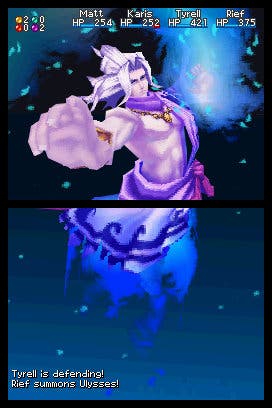Golden Sun: Dark Dawn
Everything is illuminated.
That title is a curious contradiction (if the sun really is golden, how can the dawn be dark?) and there's another that lies at the heart of Golden Sun. It seems creators Hiroyuki and Shugo Takahashi can't make their minds up whether the magical force of Alchemy – which either binds the world of Weyard together, is responsible for its current state, or perhaps both – is a bad or a good thing.
The first game's central quest tasked players with preventing two characters from releasing Alchemy into the world. In a neat twist, the sequel saw you controlling one of the first game's antagonists, who discovers that its release would benefit the world. Yet the arrival of the Golden Sun is ultimately responsible for the destruction of certain parts of Weyard, for which the heroes of the first two games are widely resented. Everywhere, that is, except in their home town of Vale, despite said hamlet being all but destroyed in the process.
In summary: no idea.
If you've not played the previous games, don't worry: Dark Dawn thoughtfully highlights any important names or references in red, which you can tap with the stylus for a bit of background info. It's one of a number of additions with player convenience in mind. You can choose from either stylus or button controls for just about everything, speed up the message text, and turn off the odd burbling noises that accompany each line of dialogue.

Ignore the handful of concessions to the modern gamer – and the 3D graphics, which are among the most impressive on DS – and this could easily have been released straight after the second game in 2003. But while the mechanics remain the same, the world of Weyard has moved on 30 years. Heroes Isaac and Garet have aged in the way only JRPG characters can: by adopting ill-advised facial hair. In the former's case, it's a large blonde beard, while the latter sports a horrible pencil moustache.
Though these two make up half of your party in the opening hour, for the rest of the game you control their descendants. Matthew, Isaac's son, is the de facto leader. He's joined by Garet's kid, hot-headed Tyrell, and Ivan's daughter, the feisty and forthright Karis. It's not long before you're joined by Rief, son of Mia. These names might not mean anything to the newcomer, but it's a nice bit of fan service for those who loved the first two games.
And there were plenty that did, if the rapturous reception which greeted the initial announcement of Dark Dawn at last year's E3 is anything to go by. That's not too great a surprise; Golden Sun and its sequel were very well-made RPGs with interesting plots and a great battle system. That Dark Dawn is practically the dictionary definition of 'more of the same' shouldn't be of concern to those players, though it's easy to imagine some newcomers playing for an hour or two and wondering what all the fuss is about.
There's very little here that could reasonably be considered new, though naturally there are exceptions to that rule. What the graphics lack in the simple clarity of the 2D games they more than make up with in the vibrancy of the environments, the expressiveness of the characters, and the spectacular effects showcased during the battle sequences. The puzzle elements in the game's dungeons seem more prominent, as characters use their magic abilities (or Psynergy) to manipulate the environment to progress.








